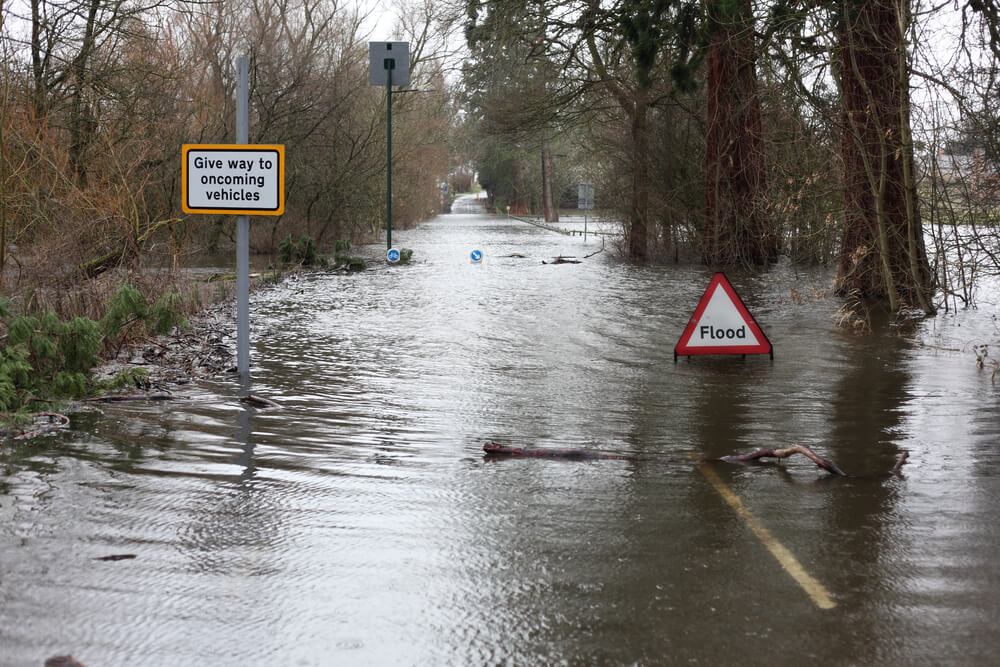
It probably won’t have escaped your attention that flooding over recent years appears to be becoming more and more commonplace. Scientists are enjoying themselves arguing about whether this is due to global warming or not and if it is, just what role human intervention is playing in the problem.
Interesting as that debate is, the issues for static caravan owners are rather more prosaic and pragmatic.
Flooding and your static caravan
Bad weather (whatever the season) brings a degree of concern amongst the owners of static caravans for the battering that might be brought on by storms – for good reason, too, given the amount of damage that might be caused.
In an island nation such as Britain, given its many rivers which might become swollen by torrential winter rains, damage – or indeed total loss – as a result of flooding is an ever-present concern for the owners of static caravans.
Examples of flood damage to static caravans may be legend and are well illustrated by a video published by Wales on Line on the 14th of February 2020, which captured the moments when a static caravan was lifted up and carried away on a swollen Welsh river during Storm Ciara. The area has been subject to severe flooding three times in the past eight years according to the news report.
Earlier the same winter, the York Press reported the fate of 12 static caravans affected by flooding at a holiday park near Scarborough.
Whatever the actual conditions and damage from one winter to the next, however, some issues seem indisputable:
- many caravan sites are located in low lying areas either directly adjacent to large areas of water or indeed the coast and sea itself;
- the news broadcasts over recent years have regularly featured worrying shots of damage caused to caravans as well as some being swept away in torrents of water; and
- this problem is highly unlikely to vanish in the near future.
So, what options do holiday caravan owners have in this area? The good news is that you might still be able to arrange for cover of your static caravan against the risk of flooding, subject to a few simple and straightforward considerations.
The risk of flooding – is it a “material fact”?
A basic tenet of English law is that insurance contracts are based on the principle of “utmost good faith” (uberimae fidei to give it its formal Latin term).
This requires the insured to declare at the outset – or subsequently if the situation changes – any “material fact” likely to affect the risks that are insured. A material fact, in other words, is an event or information which makes a risk greater than usual.
If the site on which your static caravan is pitched has been subject to flooding in the past, therefore, this is considered to be a material fact and must be disclosed to your insurer – if it is not, the insurer may claim a breach of your duty of utmost good faith and void any subsequent claim.
What is the risk of flooding?
Nobody can tell you, unconditionally, whether or not your caravan and its site are going to be subject to flooding – the effects of which can obviously be severe. Different parts of the country, of course, each have a different level of risk.
Because of their very nature as holiday homes, caravan parks are often situated close to the coast or along the banks of some scenic inland waterway.
Research the risks in your area, therefore, by searching the Environment Agency’s scalable map of the risk of flooding from rivers and the sea in any given part of England and Wales.
It is not just the geographical location of your static caravans park which may determine the risk, but your actual pitch within it – if you are worried about the risk of flooding you might consider bidding for an alternative pitch on higher ground.
Check your static caravan insurance policy
Make sure to look carefully at your static caravan insurance policy quote so that you choose the most suitable insurance solution. While you will need to make sure you have the standard type of cover – such as loss, damage, and theft – you may also need to choose one that covers flood insurance.
Some static caravan insurance policies may have complete exclusion for flood risks, others may cover them but with numerous conditions and yet others may impose punitive additional premiums for caravans in flood risk areas.
Speak to your static caravan insurance provider if you are unsure as to what your policy cover entails.
What you may need to be particularly careful of is being in a caravan with an insurance policy that specifically excludes flood risk because even on caravan sites with no previous history of problems, flooding may arise unexpectedly.
You have probably given serious thought to insurance cover for your caravan – if you are also worried about the risk of your caravan flooding, you might want to consult a specialist insurer, such as us here at Cover4Caravans, on the subject, and here’s why:
- whenever you arrange insurance cover for your caravan, your insurer naturally needs to be able to assess the risks of its loss or damage – that is what insurance is all about;
- if the siting of your static caravan is in an area perceived to be vulnerable to flooding or has been affected by it in the past, the insurers take this into account when offering to insure the risk;
- the assessment may result in no change to the policy proposal, or caravan insurance premiums may be increased to reflect the heightened risk or your request for cover may be rejected;
- a specialist caravan insurance provider is familiar with the particular problems likely to be faced by owners of static caravans and to have established contacts with those niche insurers prepared to advance cover in areas of risk;
- if you consider the cost of caravan insurance premiums too expensive, however, a specialist provider may instead offer caravan insurance quotes on alternative policies which provide comprehensive cover (such as theft and contents cover), with the exclusion of flood risks in particular.
Although the risk of flooding is likely to be a particular worry for the owners of static caravans sited in vulnerable areas, caravan insurance is not always out of the question, provided certain basic considerations are taken into account.
Is my proposal for insurance cover going to be rejected if there has been flooding in the past?
If you tell any existing or prospective insurer that there has been a problem with flooding in the past, it does not automatically follow that your application for cover is going to be declined.
Instead, the risk of it happening again is considered by the insurer and, if it is deemed necessary, an adjustment of the premiums payable may be made.
Naturally, some parts of the country might be more vulnerable to the possibility of flooding than others – even where there has been no apparent problem in the past.
So, different insurers are likely to adopt significantly different criteria when assessing the current risk.
Some providers may offer cover against flooding whereas others may not.
Specialist providers
It is for just that reason you might want to consult a specialist provider of static caravan insurance – such as those of us here at Cover4Caravans.
Based on our intimate knowledge of the insurance market, we may be able to identify those insurers prepared to entertain cover for static caravans in areas vulnerable to flooding.
Is your static caravan park prepared?
When choosing the site for your static caravan, you might want to investigate the extent to which the park’s management might be prepared for the risk of flooding.
The government has published quite detailed guidance for static caravan park owners where there is any likelihood of flooding. The local authority licence granted to your park owners may also contain conditions relating to their displaying flood warning notices and information, together with a flood plan where appropriate.
Naturally, you should make yourself aware of any such information provided and enquire whether a flood plan exists – and if it does, be sure to read it.
Any flood plan relating to the park on which your static caravan is pitched also needs to be incorporated into the management’s overall site plan, to show such important information as gas and electricity isolation points (so they can be turned off in an emergency), assembly points and evacuation routes, the location of life-rings and the formulation of traffic management plans.
On vulnerable sites, you are likely to find that static caravans need to be located on the highest ground possible, fitted with flotation devices on the underside, raised by approximately 0.5 metres above ground on axle stands and firmly anchored into position.
Specifics for high flood risk areas
If it appears that your chosen site or caravan park is in a high flood risk area, check that the caravan site owners are aware of the government’s guidelines for mitigating those risks.
Be certain that you know where the emergency assembly and evacuation points are for your site. Do not leave trying to find this out until a crisis has struck.
It would also be sensible to check that you fully understand your static caravan insurance position in terms of the provider’s requirements relating to maintaining your cover in place and any specific conditions that might apply.
Review of the general principles for avoiding flooding risks
Whether your caravan site is low or high risk, it might be prudent to consider some of the following to mitigate any potential flood damage:
- try to select caravan berths that are located on higher ground within the site rather than lower;
- with the help of any relevant expert advice, carefully construct your own flood plan. Essentially, that should be designed to tell you exactly what you have to do should you be, however unexpectedly, hit by flooding;
- you should be absolutely clear where your gas, water and electrical master switches are. Ensure these are all switched off in the event of flooding. While a caravan site owner should also have such a plan, don’t rely on what they may do in these areas but take your own steps to keep yourself safe;
- check that you have adequate emergency lighting and perhaps portable heating of types that cannot be put at risk by a flood;
- keep a supply of good waterproof clothes and boots to hand. Remember, clothing that can cope with heavy rainfall is not the same as that required to protect you if you are wading through perhaps knee-deep water;
- store some emergency high energy foodstuffs with a long shelf life in waterproof containers in your caravan.
We hope this article has provided some useful tips and advice. If you require any clarification on what your static caravan insurance policy covers, please do contact us. We’d be very happy to help.

